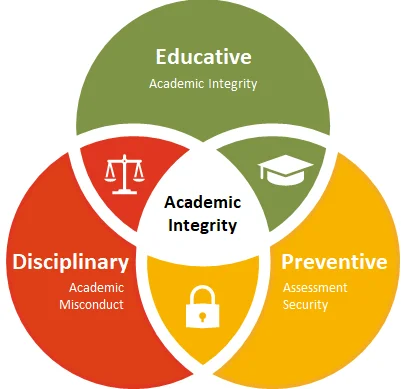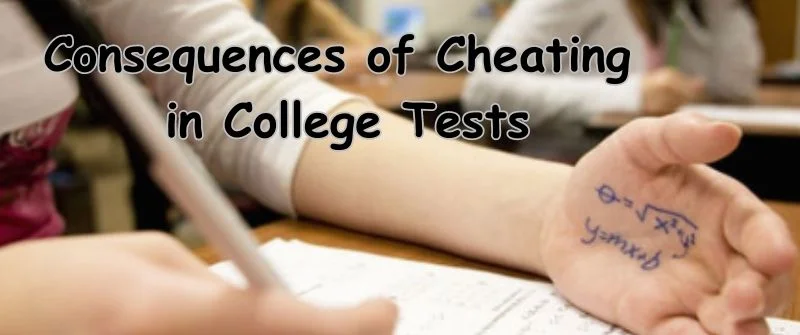When committed at the collegiate level, cheating can have far-reaching repercussions beyond the immediate academic area. Even though many different forces could lead to the temptation to cheat, such as the desire for better grades or the fear of failing, the consequences of cheating can be quite severe.
Cheating not only sacrifices the integrity of the educational system, but it also erodes trust among peers and professors, and it can lead to long-lasting effects on one’s academic and professional reputation. In this write-up, we intend to explore some of the consequences of cheating in college.
Consequences of Cheating in College for the Student
1. Academic Repercussions

When caught cheating in college, students face serious academic consequences. The most immediate repercussion is the possibility of disciplinary action against the student.
Remember, this may take the form of failing grades on a particular assignment or exam, failing the entire course, being placed on academic probation, or even being expelled.
Also, these behaviors not only slow down the student’s academic development, it may also have long-term repercussions on the student’s transcript and their total grade point average.
Additionally, repeated cheating can lead to a damaged academic reputation, making it difficult to gain admission to graduate programs or secure work in the future.
This is because a damaged academic reputation makes it more difficult to prove academic honesty.
2. Loss of knowledge and Skills
When a student results in cheating at college, they lose knowledge and skills. Students who participate in dishonest activities are robbing themselves of the ability to acquire and understand the material being studied.
Their capacity to understand essential ideas, grow their skills in critical thinking, and effectively apply what they have learned needs to improve as a result. Consequently, the student’s educational experience becomes superficial, lacking genuine intellectual growth.
In the long run, this shortcoming can impair their capacity to perform effectively in higher-level courses, excel in their chosen area, and adapt to challenges in the real world that demand a firm foundation of knowledge and abilities.
3. Damage to Personal Integrity
Cheating in college inflicts significant damage to a student’s integrity. It requires betraying one’s principles, ethics, and sense of right and wrong. Notably, the internal conflict arising from such behavior can lead to feelings of guilt, shame, and a loss of self-respect.
The loss of one’s integrity harms one’s academic achievement and seeps into many other areas of one’s life. Mostly, it can harm the student’s relationships, personal growth, and general well-being since it can impede the development of strong character, integrity, and the abilities necessary to make ethical decisions.
4. Stagnated Personal Growth

Cheating in college greatly affect a student’s progress. By resorting to dishonest means, pupils miss opportunities to face challenges, overcome hurdles, and develop key skills and attributes. Remember, these include critical thinking, problem-solving, resilience, and self-discipline.
Personal growth is impeded as cheating avoids the struggle and effort required for intellectual and emotional development.
Lastly, students may rely on cheating as a shortcut, hampering their capacity to develop key abilities and attributes vital for academic success and beyond.
5. Professional Reputation
If a student cheats while in college, it can significantly negatively impact their future professional reputation. A pattern of academic dishonesty can do considerable damage to a student’s credibility, which is highly valued by employers who place a high premium on integrity and ethical behavior in the workplace.
If caught, cheating can tarnish a student’s reputation, making it difficult to secure job opportunities or internships. Normally, even if the information is not directly disclosed, the guilt or fear of being found out may still weigh heavily on the student’s conscience, negatively influencing their confidence and performance in professional situations.
They may have fewer possibilities for promotion and less trust from their coworkers and superiors if they have a history of cheating, which can be a stain that follows them throughout their careers.
Consequences on the Side of the School
Damage to Institutional Reputation
Cheating on a large scale can significantly harm the reputation of the school or the university. It takes little time for word of cheating scandals to spread, tarnishing the organization’s reputation and undermining its trustworthiness. This could result in prospective students, their parents, and even alumni potential employers losing trust in the institution.
Decreased Academic Integrity

Cheating undermines the fundamental ideals of academic integrity necessary for a healthy educational setting. It destroys the trust between the teaching staff and the students and the trust that should exist among the students themselves.
This deterioration can lead to a culture of dishonesty within the school, which lowers the overall quality of education.
Impact on Institutional Policies and Resources
Cases of cheating often necessitate the implementation of stricter policies and measures to prevent future incidents.
Even so, this may involve increasing the number of monitors present during examinations, implementing software that detects plagiarism, or rethinking the procedures used to grade students.
These interventions demand additional resources, time, and effort from the institution, which takes resources away from other areas of attention and may make the student environment more stressful.
Increased Administrative Burden
Dealing with cheating cases requires significant organizational resources. Investigations, disciplinary actions, and implementing preventive measures demand time and effort from faculty, administrators, and support staff, diverting attention from other critical institutional matters.
This can create an additional burden on the school’s resources and personnel.
